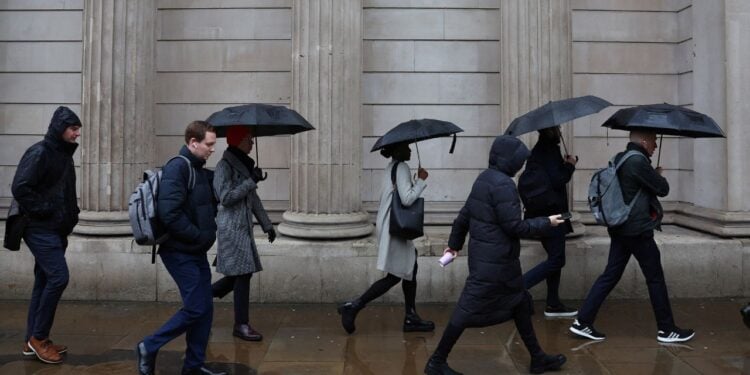Britain’s labor market showed further signs of cooling last month, according to a survey that showed the weakest wage growth since early 2021, and tax increases in last week’s budget might further hit hiring.
The Recruitment and Employment Confederation/KPMG said its gauge of starting pay for permanent roles slowed to 52.5 in October from 52.8 in September for its weakest level since February 2021 during the coronavirus pandemic.
REC’s permanent placements index fell to 44.1 from 44.9 in September and the rate of contraction was the steepest since March. The survey said firms held off hiring amid uncertainty in the lead-up to the new Labour government’s budget.
“There is little in the pay data in today’s report that suggests the Bank of England should step away from further cuts to interest rates, which will also boost business confidence,” REC chief executive Neil Carberry said.
The BoE, which is watching pay growth closely as it tries to gauge how much inflation pressure remains in the economy, reduced borrowing costs by a quarter-point to 4.75% from 5% on Thursday. It said further cuts were likely to be gradual.
REC said vacancies fell for the 12th month in a row, suggesting less demand for staff, and the number of available candidates for jobs rose for the 20th successive month — with businesses reporting the sharpest pace of increase in temporary staff availability in nearly four years.
Jon Holt, group chief executive at KPMG, said measures announced by finance minister Rachel Reeves in last week’s budget could push firms to slow their hiring further.
Reeves on Oct. 30 unveiled 40 billion pounds ($51.94 billion) in tax rises, much of it through higher social security contributions paid by businesses alongside an increase in the minimum wage for most adults, changes that are likely to hurt hiring and pay growth.
“With many of the tax rises announced in last week’s budget impacting businesses, the expectation from some chief executives is that this could further dampen hiring as companies grapple with absorbing any extra costs,” Holt said.
($1 = 0.7701 pounds)
(Reporting by Suban Abdulla; Editing by William Schomberg)



 Dr. Gleb Tsipursky – The Office Whisperer
Dr. Gleb Tsipursky – The Office Whisperer Nirit Cohen – WorkFutures
Nirit Cohen – WorkFutures Angela Howard – Culture Expert
Angela Howard – Culture Expert Drew Jones – Design & Innovation
Drew Jones – Design & Innovation Jonathan Price – CRE & Flex Expert
Jonathan Price – CRE & Flex Expert











